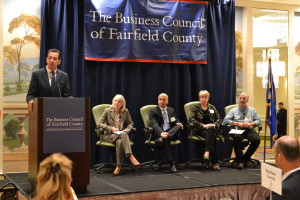Businesses may now have the chance get to rid of pesky state laws.
Gov. Dannel P. Malloy signed an executive order Oct. 16 encouraging the public to actively engage and review all legislation more than four years old.
In an address to members of the Business Council of Fairfield County at the Stamford Marriot Hotel, Malloy said he hopes to amend any laws that are now obsolete, duplicative, excessively burdensome or unnecessary.
“We know a lot of regulations no longer make sense,” Malloy said. “We know that regulation is getting in the way of business.”

The initiative is a part of Malloy”™s efforts to streamline agency policies and procedures, officials say. In July, for the first time, all state regulations were posted online, allowing the public to view the state”™s laws. Now residents will be able to provide feedback and commentary online or by email. Additionally, forums will be held across the state to instigate further discussion.
Under Malloy”™s order, any updates to old regulations will also need to include the authors”™ clear intentions. Policy goals will need to be identified, as well as how the regulation meets those goals. Additionally, authors must use clear language and include any of the legislation”™s anticipated economic impacts, whether positive or negative.
To a crowd of roughly 200 business leaders, Malloy touted the order as further proof of his commitment to growing the Connecticut economy. The group gathered Oct. 16 to discuss the state”™s economic development initiatives.
Since taking office, Connecticut has added about 1,700 jobs every month on average, he said. Through several jobs programs, the state has also significantly increased its number of loans and grants to growing companies.
Before 2010, the state issued support to about 119 companies per year. But with the Small Business Express loan program, hiring with STEP UP and the innovation ecosystem, some 880 small companies have received roughly $117 million in loans over the last two years, he said.
“In doing nothing, we were doing something,” he said, noting the state”™s previous hands-off approach encouraged startups to move to places like Brooklyn, said Malloy. “We said goodbye to thousands of jobs. Those days are gone.”
With $350,000 in loans and grants from the Small Business Express program, Newtown business owner Steve Ford said he was able to hire seven additional employees and quadruple his sales.
Created in 2011, the Small Business Express program provides loans and grants to small businesses with fewer than 100 employees. The companies must be creating new jobs and be in fields related to either precision manufacturing, exporting, business services, green and sustainable technology, bioscience or information technology sectors.
Ford said when he opened Butcher”™s Best county Market four years ago, he knew there was a demand for fresh, locally sourced meat products, but he couldn”™t scale his company up to meet the demand without additional help. He said his local bank was willing to help provide some loans, but it wasn”™t until the state “stepped up” that his local bank stepped up, too.
With the funding, he moved to a new location, expanded and hired more employees than he projected. He started with only one part-time employee.
Six of the seven employees he hired were either unemployed or working part time. Now they”™re each the breadwinners of their families.
“I am truly grateful,” Ford said. “None of this would have happened without the assistance of the government.”
The recipient of $282,000 in state support, Kate Hampford Donahue also expressed gratitude for the state”™s Small Business Express program. President of Stratford-based Hampford Research Inc., Donahue said the funding allows the chemical manufacturer to hire two new engineers.
The company faces stiff competition from companies in Asia that can offer lower prices. But the company stays ahead of the pack by guaranteeing its customers”™ intellectual property rights are protected.
Donahue said the state”™s grants helped give the company the assurances it needed to pursue its hiring needs. One of the new employees had recently been laid off before joining Hampford, while the other held a position underutilizing vital skills.
“This money made the difference for us to hire them and keep them in the state,” Donahue said. “We need homegrown, Connecticut talent to find high tech jobs.”




















